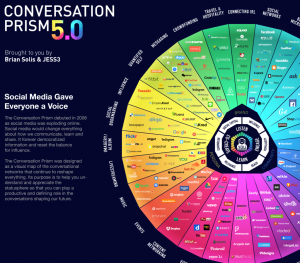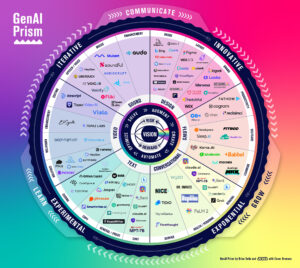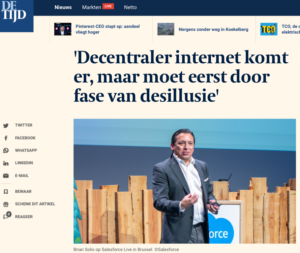Facebook hit a billion users! Twitter is the new digital water cooler! Youtube is the future of TV! Ok, you get it right? Social media is transformative. So what? Every business that thinks about customer engagement through a technological lens will miss the very thing that will keep them in business for the long-term—the impact of technology on society and behavior and how it opens up new touch points and changes expectations as a result.
Depending on your business, you may or may not already have someone dedicated to your social media strategy. Whether it is aligning with your current business objectives and priorities is a different article. The focus for our time together right now is on how you will compete for the future of attention, wherever attention is focused. All signs at the moment point to mobile as the future of engagement and commerce as smartphones and tablets become the lens for how consumers see the digital and virtual worlds.
At the end of 2011, the U.S. alone was home to more than 100 million smart phone users. By 2014, 90 million people will use tablets in the U.S., which will represent 36% of the overall Internet population. Why is this important to your business? Regardless of size, the state of mobile now insists that you think through a dedicated experience for customer engagement and commerce alike.
For years, web designers would not only develop sites, but also test their aesthetics and functionality in multiple browsers using the most common operating systems. Additionally, user testing ensured that the desired click paths and outcomes were optimized. No site can truly launch until it performs as designed for the masses. As any designer will tell you, if the click path breaks down or introduces friction, visitor frustration and abandonment isn’t far behind.
Similar to the Web, mobile is now a dedicated channel that represents a means to an end. Or said another way, mobile has become an exclusive experience rather than a bridge between people and information on the traditional or desktop web. It is still largely assumed that people on mobile devices represent the minority of web users and thus require less focus and resources than those who use desktop or laptop PCs. But with the proliferation of smart phones and tablets, the balance is shifting. The question is; have you revisited your web and mobile strategies to meet the needs and expectations of your connected customers?
Let’s take Facebook as an example. The company faces a serious dilemma as its mobile site m.facebook.com, and its dedicated app for iOS, Android, Microsoft, and Blackberry, rival its classic website Facebook.com. In May 2012, comScore reported that for the first time, mobile users in the U.S. spent more time in Facebook than those using desktops and laptops, 441 minutes vs. 391 per month. While the company has designed successful mobile products to deliver optimized, on-the-go experiences for the small screens, it has not found a viable business model to monetize this profound shift. Facebook makes the lion share of its billion-dollar revenue by serving four to seven ads at a time on the desktop. On the mobile, it only presents a few per day in its micro news feed. If a tech-savvy company such as Facebook faces this quandary, chances are, you will as well.
In a mobile economy, apps become the currency of a new information exchange. One of the most fascinating and least understood aspects of apps is that they create a contained experience that essentially is its own Internet. Everything your customer needs or could possibly need should be included in the app. And those mobile browsers that need to hit the traditional web, visitors will expect to see a page optimized for the smaller screen. Think about it for a moment. How many times have you tried to hit a site from your phone or tablet only to quit in frustration when the site would not load correctly on your screen? You may or may not choose or remember to visit that site later and that’s just one example of how designing for experiences is as much a part of form and function as it is about platform-centricity.
That ‘s the point. Customer behavior is evolving. Technology is evolving. Is your digital strategy evolving? Is it considering shifts in attention, activity, and expectations and designing new experiences to react and lead accordingly?
The time is now to answer these questions and more…
Who on your team is thinking about designing mobile experiences? How is mobile tied to the overall digital strategy? How is social and mobile complementing your web strategy? More importantly, how are people connecting or attempting to connect with you and how would they define the experience?
Answering these questions will help you design for tomorrow’s digital strategy right now. The future of online experiences is distributed, but it is also integrated in its ability to tell your story while delivering exceptional experiences optimized for each channel. Like the classic web and social media, mobile is just one of the many channels that requires a dedicated approach. And, as we’re learning, mobile will become one of the most if not the most important channel for customer engagement.
Connect with me: Twitter | LinkedIn | Facebook | Google+
This is the End of Business as Usual…do something about it!
Image credit: Shutterstock







Great post. I couldn’t agree more with your statement. My view on this is that it’s essential to plan a social and mobile strategy but, like you mentioned, it’s very important to create synergy between social and mobile. That’s why in my opinion Social and Mobile are one of the most important chapters in a modern marketing strategy 3.0.
Indeed!
Depending on your business, you need a global, local, mobile and social strategy… and it all needs to tie into content and search. Throw in PR and we have one big happy family. 🙂
🙂
I fully agree with this post. strategy is crucial and mobile and social features can boost and add valure for some web strategies!
Excellent..
Thomas Baekdal has some really intelligent thoughts about the native vs mobile app… Google him!
Thanks Joakim
With the rise of mobile social platform activity, it seems valuable for marketers to examine how their mobile strategy could take advantage of mobile features that are accessed primarily by social users. Geo-tagged location functions and camera options, for instance, have a huge impact on the current mobile social landscape. Time to move towards mobile and social marketing integration…
Yes…it’s time…and also for digital integration + real world as well!
I think that Brian points out a very interesting feature of mobile marketing (An it reminds me of an older discussion about mobile.vs.web presence): at the core of customer engagement on mobile , there is the convenience and user’s experience feature…And I like Sarah’s comment on mobile features for social users…
The problem with mobile advertising is what we found in reports wherein 2012 mobile Ad revenue fell well short of predictions. 120×120 pixel banners popping up on the small screen apparently proved to be more irritating than engaging. Advertisers need to find a different approach with mobile.
“Customer behavior is evolving. Technology is evolving. Is your digital strategy evolving” Great point, Brian!
Thanks Dave!
Great article. Another way mobile is taking over is in the use of text messages instead of email. My nuclear family primarily communicates with text messages sometimes including pictures. We find it is easier, gets a faster response, and takes less time and attention that email or a phone call.
As an author from stage would you rather try to collect email addresses or just ask everyone to text Brian to 90210 to add them to your list of engaged prospects?
I completely agree with you, Brian. I think you hit on a key point with how mobile devices are increasingly becoming a primary means by which individuals connect to the internet. I believe it is crucial that businesses prepare now for this change.
I also do not think we are too far off from new ways in which individuals will be able to interact with one other and businesses. This could be with new social media outlets or new technology. Whatever happens in the future, businesses ought to take into consideration how they can apply these new forms of media or technology to their web strategies.
Thank you Claire!
You make a great point about how social media is ever evolving. It’s imperative to have apps work correctly otherwise, you may loose valuable eyes or consumers.
Brian,
Great article and I would have to agree that nuclear text messaging is a much more effective way for obtaining consumer response than emailing, This is because text messaging feels more personal and less “andriodish” than the emailing, which I feel is disruptive and never really grabs my interest like text messaging–which can include pictures, videos and a rapid response rate. You also make a great notion about the evolution of social media and its effect on the business world, where before social media has purely friend-to-friend communication.
Thanks for the insight once again!
alex